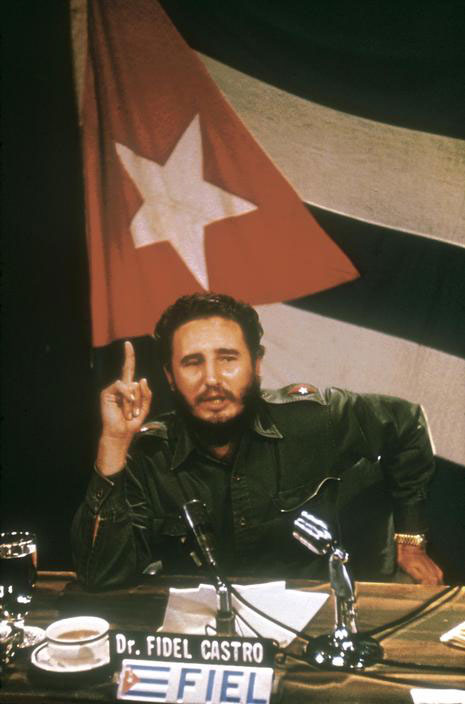A flawed leader with a flawed model and flawed practice, but still one of the greats, writes Hall Greenland.
The last of the great revolutionary leaders of the 20th century is dead. The roll-call comes back to me from my youth – Gandhi, Nehru, Ho Chi Minh, Mao, Lumumba, Sukarno, Nasser, Tito, Ben Bella and so the list could go on. And not forgetting Martin Luther King and Malcolm. Not to mention the other great ‘honorary’ Cuban – Che.
Charismatic leaders – it was a key characteristic of the great anti-colonial revolution of the last century. What a glorious epochal advance that revolution was, the end of empires and the old imperialisms, the entry of people of colour onto the stage of history as self-determining agents. It is not surprising that it threw up such extraordinary figures – figures that matched the historical grandeur of the moment.
Talking of grandeur, it was hard to beat the sheer historical glamour of the Cuban Revolution and its leader. A small band of comrades, borne by their yacht Granma from Mexico to a small bay on the remote coast of Cuba. The life and death struggle to elude the regular army. The creation of the armed commune in the mountains. Then the insurrectionary march from one end of the island to the other, joined by a triumphal and joyous people. An uprising led by handsome bearded revolutionaries at the head of a moveable and armed festival of the oppressed. All captured in photographs and occasionally on film – and in black and white at that – with Fidel centre stage.

It was the revolution not just from central casting but redolent of all the great liberations of our historical culture. Here I’m thinking of Garibaldi and his red shirts invading Sicily in 1860 and sparking peasant uprisings and the march up the peninsula towards Rome. But even further back, Jesus of Nazareth’s entry into Jerusalem. Hyperbole? Perhaps. But that was what it was like back in the middle decades of the last century.
And then Fidel and the Cubans were the great and heroic survivors, defying the most powerful of all the imperialisms. Surviving because of the people armed, triumphant despite the Bay of Pigs and all the CIA’s assassination attempts. Laughable plots, yes (who can forget the exploding cigars?) but deadly in intent.
In order to secure Cuba’s independence it was necessary to seize control of its economy and that meant the nationalization of the major industries and the expropriation of the foreign and comprador owners. That Washington was not willing to countenance. And so the long [and continuing]blockade and sanctions began.
And so came Fidel’s turn to the Soviet Union which generously ensured the survival of the Cuban Revolution. That generosity was historically determined – the Soviet Union, after all, was the great survivor against imperialism of the last century. Its support of the Cubans was ‘natural’.
Sure there were ‘mistakes’ which determined the fate of the Cuban Revolution in its first decade. I am thinking here of the moral incentives, the voluntarism, the wager on sugar as well as the monolithic party regime. But in this, Fidel and the Cubans were arguably captives of history. There was no other model – the attempts to create another one were either short-lived (Algeria) or too limited (Yugoslavia). The downside of the Soviet aid was the adoption of the Soviet model.
This meant there were unforgivable acts by Fidel. Back in the 60s we were grievously shocked by Fidel’s support of the Soviet backed invasion of Czechoslovakia and the suppression of the attempt to create a democratic socialism.
But the defiance and survival went on down the decades and for that Fidel and Cuba were honoured. As they rightly were for the extraordinary achievements domestically: mass literacy, a first world education system and the best damn medical practice on the planet. And Fidel kept the revolutionary conscience alive – the Cuban support, paid for in the lives of self-sacrificing men and women, for the Angolans and the South Africans in their emancipatory struggles is rightly legendary and celebrated.
We shall not see the like of Fidel again. Other revolutions of last century, principally feminism and the rising cultural level, mean revolutions will be very different in this century. But that does not mean that we cannot go on critically and generously honouring the amazing revolutionary attempts and their heroes and heroines of the last century. Fidel is part of that Pantheon.
Donate To New Matilda
New Matilda is a small, independent media outlet. We survive through reader contributions, and never losing a lawsuit. If you got something from this article, giving something back helps us to continue speaking truth to power. Every little bit counts.






